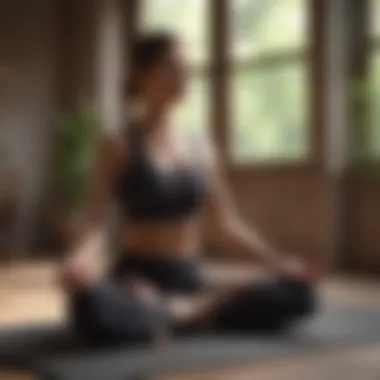Effective Strategies for Relaxing Nerves and Reducing Stress


Intro
In today's fast-paced world, where the constant chime of notifications beckons and deadlines loom, the need for effective strategies to relax nerves has never been more pressing. Stress and anxiety can take a toll on both physical and mental well-being. The good news is that there are a variety of techniques and lifestyle alterations that can help individuals restore a sense of calm. This article delves into these methods, equipping readers with the knowledge and tools to manage day-to-day pressures more effectively.
Key Benefits
Adopting strategies to relax nerves not only improves immediate comfort but also offers long-term benefits. Here, we take a closer look at how these practices can enhance both physical health and mental well-being.
Physical Health Benefits
Taking steps to unwind can contribute significantly to physical health. A few key benefits include:
- Improved Sleep Quality: Engaging in relaxation techniques can lead to better, more restful sleep. For instance, practices like meditation and deep breathing can quiet the racing mind, making it easier to drift into slumber.
- Reduced Muscle Tension: Techniques such as progressive muscle relaxation can alleviate tension held in the body, which often accumulates during stressful periods.
- Lowered Blood Pressure: Regular relaxation practices can help reduce stress hormone levels, thus lowering blood pressure over time.
Mental Well-being Enhancements
Mental health is often intertwined with physical state. Here are some enhancements relaxation can bring:
- Decreased Anxiety Levels: Implementing mindfulness activities can create a mental buffer against anxiety triggers. Practicing being in the moment can lead to a clearer, more focused mind.
- Boosted Mood: Involvement in relaxation techniques can increase serotonin levels, naturally enhancing mood and outlook.
- Enhanced Cognitive Function: A calm mind improves decision-making and problem-solving skills, enabling better performance under pressure.
"The mind is like water. When it’s turbulent, it’s difficult to see. When it’s calm, everything becomes clear."
Practical Tips
To effectively manage stress and transform those nerves into a source of strength rather than anxiety, consider these practical tips.
Effective Meal Planning
Nutrition plays a crucial role in emotional regulation. Here are some meal planning tips:
- Incorporate Omega-3 Fatty Acids: Foods such as fatty fish, walnuts, and flaxseeds can combat depressive symptoms.
- Prioritize whole Foods: Fresh fruits, vegetables, and whole grains supply essential nutrients that fuel cognitive function, supporting a sharper mind.
- Stay Hydrated: Dehydration can lead to mood swings and heightened stress. Keeping water on hand is a simple yet effective way to maintain mental clarity.
Quick and Efficient Workouts
Physical activity serves as a robust antidote to stress. Here are some practical ways to increase movement:
- Short Bursts of Exercise: Even a brisk 10-minute walk can release endorphins, those lovely feel-good hormones, improving mood.
- Incorporate Stretching: Simple stretching can ease muscle tightness and reduce tension, showing immediate improvement in how you feel.
- Mindful Movement: Engage in practices like yoga or tai chi, which combine physical movement with focused breathing for deeper relaxation.
By experimenting with the strategies laid out above, individuals can begin to develop their own tailored approach to not just survive but thrive in their daily lives.
Foreword to Nerve Relaxation
In today's fast-paced world, the notion of nerve relaxation often feels like a distant dream for many individuals. The pressures of work, social expectations, and the general hustle and bustle can leave one feeling overwhelmed and on edge. Understanding how to relax the nerves is essential, as it transcends mere comfort; it involves holistic well-being for both mental and physical health.
Recognizing the importance of relaxing the nerves means acknowledging that stress can seep into various aspects of life. When nerves are frazzled, not only is mood affected, but physical health can take a hit as well. Tension can lead to headaches, digestive issues, and muscle pain, creating a vicious cycle that diminishes overall well-being.
- Improved Focus: Calm nerves lead to sharper mental clarity, enabling better decision-making.
- Better Sleep: Relaxing the mind can help in achieving quality sleep, leading to a more energized day.
- Enhanced Relationships: When one is calm, interactions with others are likely to be more positive and constructive.
As we delve deeper into this guide, we will unpack specific strategies that integrate mindfulness, physical health, and cognitive techniques—all of which play significant roles in nerve relaxation. This is not just about quick fixes; it's about cultivating a lifestyle that promotes lasting tranquility.
Understanding the Nervous System
To grasp the concept of nerve relaxation, it's vital to understand the nervous system's structure and functioning. The nervous system consists of two main parts: the central nervous system (CNS)—which encapsulates the brain and spinal cord—and the peripheral nervous system (PNS). The PNS further branches into the somatic and autonomic systems.
The autonomic nervous system can be subdivided into the sympathetic and parasympathetic systems. The sympathetic system is activated during stress scenarios, triggering the body's fight-or-flight response. This is when anxiety begins to heighten and the nervous person feels the jitters. Conversely, the parasympathetic system promotes relaxation, restoring the body to a state of calm.
For effective nerve relaxation, individuals must learn to engage the parasympathetic system intentionally through various relaxation techniques. Awareness of how these systems operate lays the groundwork for incorporating effective strategies.
The Impact of Stress and Anxiety
Stress and anxiety are not just fleeting feelings; they can have profound effects on how we function day-to-day. High stress levels provoke physiological responses that can manifest as headaches, muscle tension, or even digestive issues. When a person is stressed, it's often as if they are driving a car with the brakes engaged—the body is not free to operate smoothly.
The effects of prolonged stress ripple outwards, creating a detrimental feedback loop. For instance, chronic anxiety can lead to social withdrawal, which in turn heightens feelings of isolation and worry—further escalating the stress response.
Moreover, the pervasive nature of stress can affect personal relationships, work performance, and overall life satisfaction. Learning to manage this stress not only impacts the individual but enhances interactions with others. Implementing relaxation strategies can shift an individual from a reactive state to one of mindfulness, enabling a healthier approach to challenges and allowing the mind to reset.
Mindfulness Techniques
Mindfulness techniques are paramount when tackling the challenges of stress and anxiety. Engaging with the present fosters a unique relationship with one’s thoughts and feelings, allowing a person to step back from the chaos of daily life. This approach does not merely sweep problems under the rug. Instead, it encourages individuals to acknowledge their experiences while simultaneously creating a sense of calm and focus. The interplay between awareness and acceptance has profound benefits, from reducing anxiety to enhancing overall mental clarity.
Presence in the Moment
Being present is the cornerstone of mindfulness. In a world filled with distractions, where the mind often drifts to past regrets or future worries, fostering presence can feel like a tall order. But it doesn’t have to be. Practicing presence means anchoring attention to the here and now. This can be as simple as concentrating on your breath, feeling the weight of your body in a chair, or devoting attention to sounds around you. By tuning into these sensory experiences, an individual can cultivate a grounding effect.
Often, people notice significant changes in their emotional states through simple activities like sipping tea mindfully, savoring each flavor and aroma as a means of harmonizing the body and mind. When practiced regularly, these moments can transform the way you navigate through stress, allowing inner peace to take root even in the midst of chaos.
Breathing Exercises


Breathing exercises serve as a bridge connecting the mind and body. Many might not realize it, but the rhythm of our breath can heavily influence emotional states. When anxious, it's common for breathing to become shallow or rapid. By consciously controlling breath, one can trigger the body's relaxation response.
A popular technique is the 4-7-8 method: inhale through the nose for four seconds, hold for seven, and exhale through the mouth for eight. Repeat this a few times, and it’s likely that tension will ease, leading to a more tranquil state of mind. Incorporating such exercises into daily routines can heighten awareness and provide a simple yet effective tool for managing life's stresses.
Meditation Practices
Meditation, often viewed as a daunting endeavor, can be an accessible practice that calms the mind. The beauty of meditation lies in its flexibility—there’s no one-size-fits-all. It may include sitting in silence, focusing on a mantra, or guiding oneself through a visualization. All forms share a common goal: to cultivate an awareness that transcends racing thoughts and anxiety’s grasp.
Starting with just a few minutes a day can yield remarkable benefits over time. People can explore various types of meditation such as guided meditation apps or simply meditating in nature, establishing a personal connection to tranquility. It's essential to approach this practice with a non-judgmental attitude, embracing each session—whether smooth or challenging—as part of the journey towards serenity.
"Mindfulness isn't about making your thoughts go away but rather observing them without attachment."
In closing, adopting mindfulness techniques like the art of presence, structured breathing, and meditation not only supports the reduction of stress but also enhances a person's overall quality of life. Delving into these practices guides individuals through life's complexities with grace and resilience.
Physical Approaches to Relaxation
Engaging in physical approaches to relaxation is vital in the quest for achieving a peaceful state of mind and reducing anxiety. The body and mind are intricately linked; therefore, alleviating physical tension can have a profound effect on mental well-being. This section dives into the crucial role that movement, stretching, and intentional exercise play in calming the nervous system and promoting overall health. Regular physical activity not only boosts mood levels but also enhances the quality of sleep, which is often disrupted when one is anxious. The importance of these approaches cannot be understated—they create a holistic strategy for managing stress and fostering calm.
Importance of Regular Exercise
Regular exercise functions as one of the most effective ways to manage stress and keep those pesky nerves at bay. It’s not just about pumping iron or running marathons, though; it’s about finding movement that resonates with the individual. Whether it’s a brisk walk in the park or a dance class, any physical activity helps release endorphins—those feel-good hormones that naturally combat stress. This biological response helps stabilize mood and reduce feelings of anxiety.
Moreover, having a routine in place can significantly influence mental clarity and focus. It encourages discipline and ownership of one’s health. An added bonus is the sense of accomplishment one feels after completing a workout. Setting small goals, such as walking 10,000 steps or attending three yoga classes per week, can greatly boost confidence.
Yoga for Nerve Relief
Yoga stands out as an excellent method for both relaxation and physical well-being. It intricately weaves together meditation and movement, making it a prime candidate for nerve relief. Each pose, or asana, acts as a gentle reminder for your body and mind to work in harmony, which is crucial for reducing stress.
Different styles of yoga cater to various needs.
- Hatha Yoga offers a slower pace, perfect for relaxation.
- Vinyasa provides a flowing sequence that helps clear the mind.
- Yin Yoga involves long-held stretches focusing on deeper connective tissues.
When practiced consistently, yoga not only helps strengthen muscles but also facilitates a meditative state where one can explore and let go of worries. Moreover, it’s a practice that can be adapted easily to fit one's lifestyle, as even just 10 minutes of gentle stretching can initiate a feeling of calmness.
Stretching Techniques
Stretching may sound overly simplistic, but it’s often overlooked as a potent tool against anxiety. The act of stretching eases muscle tension, releases built-up stress, and promotes blood circulation, directly influencing mental clarity.
Some effective stretching routines include:
- Neck stretches to relieve tightness from prolonged computer use.
- Shoulder rolls help in lowering anxiety by opening up the chest and promoting better breathing.
- Forward bends soothe the nervous system and ground the mind.
Utilizing stretching as a daily practice can be transformative. It only takes a few minutes to work through a simple routine, and the benefits extend beyond physical relaxation—it cultivates a mindful moment within the day to reconnect with one’s body.
"Regular exercise, complemented by yoga and stretching, forms a solid foundation for a deeper, more lasting relaxation, nurturing both the body and mind."
These physical approaches not only alleviate immediate tension but also encourage ongoing strategies that promote well-being and stave off stress-induced issues in the long run. By embracing these practices, one can pave the way towards a more peaceful existence.
Nutrition and Nerve Health
Nutrition plays an often understated role in maintaining a healthy nervous system. Understanding how what we eat impacts our nerves can be a game changer for those looking to alleviate stress and improve overall mental health. Balancing one’s diet not only has the potential to boost mood but also contributes significantly to nerve health, helping to protect against the potential pitfalls of anxiety and stress.
By incorporating a sustained focus on nutrition, individuals can create a supportive environment within their body, fostering resilience in the face of stressors. The philosophy behind this is not merely about avoiding negative impacts but actively pursuing a diet that promotes wellness.
The Role of Diet in Stress Management
An individual's dietary habits are pivotal when it comes to managing stress. Foods can influence hormone levels and brain function, essentially acting as fuel for how we feel. For instance, a diet rich in whole, unprocessed foods generally leads to a more stable mood. On the flip side, diets high in refined sugars and artificial ingredients can be counterproductive, often leading to spikes and crashes that trigger anxiety.
Key aspects to consider include:
- Whole Grains: Foods like brown rice, oatmeal, and quinoa provide steady energy, helping to keep blood sugar levels stable.
- Fruits and Vegetables: These provide essential vitamins and minerals that combat oxidative stress, a contributor to anxiety.
- Omega-3 Fatty Acids: Found in fish, walnuts, and flaxseeds, these fats support brain health and are linked to lower levels of anxiety and depression.
Opting for a balanced diet full of varied nutrients can create a more grounded sense of well-being, ultimately serving as a natural buffer against the day-to-day stressors we encounter.
Essential Nutrients for Nerve Relaxation
Diving deeper into the subject of nutrition, certain nutrients stand out for their specific contributions to nerve relaxation. For instance, magnesium is often dubbed the ‘calm mineral’ due to its ability to relax muscles and nerves alike. Foods rich in magnesium, such as spinach, almonds, and black beans should be staple additions to one's diet.
Other notable nutrients to pay attention to include:
- B Vitamins: Especially B12, which is crucial for nerve function, and can be found in animal products like eggs, dairy, and meat. For vegetarian sources, consider fortified cereals and nutritional yeast.
- L-Theanine: An amino acid primarily found in green tea, it’s revered for its calming properties, aiding in mental clarity and stress reduction.
- Antioxidants: Consider foods such as berries and artichokes, which can protect the body against oxidative stress, contributing to a more resilient nervous system.
Paying attention to these nutrients can lead to a profound impact on overcoming stress and promoting neurological health.
Hydration and Its Effects
Often overlooked, hydration is a cornerstone of effective nerve health. Even minor dehydration can lead to cognitive dysfunction, fatigue, and increased irritability. Water aids in the transport of nutrients to cells and the removal of waste, ensuring that the nervous system operates smoothly.
Practical hydration tips include:


- Regular Water Intake: Aim for at least eight 8-ounce glasses a day, adjusting for activity levels, climate, and personal needs.
- Electrolytes: Especially after intense exercise or in high heat, consider beverages that replenish electrolytes, such as coconut water or homemade electrolyte drinks with a pinch of salt and a squeeze of lemon.
- Monitoring Hydration Levels: Pay attention to the color of your urine; a light yellow hue indicates good hydration, while darker shades may suggest a need for more fluids.
To conclude, prioritizing nutrition can serve as a strong foundation for relaxing one’s nerves. It is about adopting a holistic approach, emphasizing meal quality and hydration as central components in managing stress and supporting overall nerve health.
"You are what you eat"—a wise saying that rings especially true in the context of nerve relaxation and mental well-being.
Herbal and Natural Remedies
In the realm of relaxation, herbal and natural remedies offer a treasure trove of benefits that can soothe the frayed nerves and promote calmness. These approaches not only provide refuge from the hustle and bustle of daily life but also align closely with the body's intrinsic need for balance. For health professionals, wellness coaches, and similar practitioners, integrating these remedies into their clients’ routines can result in a more holistic approach to managing stress and anxiety.
Incorporating herbal and natural remedies can be invaluable for several reasons. They typically present fewer side effects than pharmaceutical options and come laden with rich histories of traditional use. Besides, the ritual of preparing herbal teas or essential oils can itself be a source of grounding, encouraging mindfulness. However, it's crucial to consider factors like quality and individual health conditions when recommending these solutions.
The Calming Effects of Herbal Teas
Herbal teas have carved out their place as a popular go-to for millions seeking a moment of tranquillity. Some of the best known, like chamomile and lavender, carry notable calming properties. Chamomile, with its gentle taste, has been widely studied for its potential to reduce anxiety and improve sleep quality. According to folklore, a cup of chamomile tea before bed might be your ticket to peaceful slumber.
Other varieties, such as lemon balm and passionflower, also show promise. Lemon balm, often regarded as nature's anti-anxiety remedy, has been suggested to lower levels of stress hormones—helping one feel centered during chaotic moments. The mere act of brewing these teas can also instill a sense of calm.
- Key Benefits of Herbal Teas
- Reduces anxiety levels
- May improve sleep quality
- Often caffeine-free, allowing for consumption at any time of day
For those looking for more variety, blends that include herbs like hibiscus or peppermint not only bring unique flavors but also various health benefits, making them worth exploring.
Essential Oils and Their Benefits
Essential oils have gained traction in the realm of relaxation due to their aromatic properties and versatile applications. A single whiff of lavender or sandalwood can whisk someone away from the clutches of stress and transport them to a more serene state of mind. The olfactory system has a direct line to the brain's emotional centers, making smells a powerful tool for managing moods.
Some popular essential oils include:
- Lavender: Known for its ability to reduce anxiety and promote sleep.
- Bergamot: Often used to elevate mood and reduce stress.
- Frankincense: Traditionally utilized to enhance meditation and relaxation.
To use these oils effectively, individuals can diffuse them in their living spaces, add a few drops to their bath, or even apply them topically when mixed with a carrier oil. However, it is wise to consider any allergies or skin sensitivities before application.
Supplements for Nerve Relaxation
The landscape of supplements is brimming with options aimed at nerve relaxation. While it’s tempting to reach for over-the-counter quick fixes, certain vitamins and herbs stand out when the discussion turns to naturally calming the nervous system.
Some noteworthy supplements include:
- Magnesium: Often referred to as a relaxation mineral, magnesium deficiency is linked with increased anxiety levels.
- L-Theanine: Found in green tea, it may promote relaxation without drowsiness.
- Ashwagandha: An adaptogen that helps the body manage stress and may lower cortisol levels.
Incorporating these supplements may prove beneficial, but a conversation with a healthcare provider is always recommended to ensure they complement one's specific health needs.
"Nature itself is the best physician." — Hippocrates
Bringing herbal and natural remedies into one's life can create a veritable toolbox for relaxation. Each remedy provides an avenue to explore, catering to different preferences and needs, ultimately assisting in the quest for calming those nerves.
Cognitive Behavioral Strategies
Cognitive Behavioral Strategies (CBS) play a crucial role in the realm of nerve relaxation. They focus on the mental processes that contribute to stress and anxiety, directly impacting one's emotional state. By honing in on these cognitive patterns, individuals can carve a pathway out of the morass of overwhelming feelings. This approach not only equips individuals with practical tools to manage their emotional well-being but also fosters a deeper understanding of the intricate mind-body connection.
In essence, the beauty of CBS lies in its applicability; rather than being bound by abstract concepts, these strategies allow real-life changes by reshaping thought processes. This can lead to the diminishment of stress and a significant boost in overall mental health. Here, we'll break down the core components that make CBS a identifying thread in the tapestry of relaxation techniques.
Identifying Triggers
A fundamental step in utilizing CBS is recognizing what triggers anxiety and stress. These triggers can be varied; they may present themselves in social situations, work pressure, or even personal relationships. To effectively identify triggers, individuals might consider keeping a stress diary. This involves noting the times and circumstances where feelings of anxiety arise.
Some prompts that could help uncover these triggers include:
- Reflecting on recent stressful situations and their common elements.
- Noting physical sensations that accompany anxiety—like tightness in the chest or headaches.
- Considering thoughts circulating during these moments; negative self-talk can act as a significant indicator.
Being mindful of these triggers provides a solid foundation for managing responses and can lead to proactive coping strategies that lessen their grips.
Reframing Negative Thoughts
Negative thought patterns often act as the tipping point for anxiety and stress responses. Reframing these thoughts means taking a less favorable perspective and reshaping it into something constructive. This doesn’t entail ignoring difficulties but rather approaching them with a different mindset. For example, instead of thinking, "I’ll never get through this presentation," one could reframe it to, "I’ve prepared well, and I can share valuable insights."
Strategies that might support this reframing process include:
- Challenging assumptions: Asking oneself whether thoughts are based on facts or unfounded fears.
- Positive affirmations: Using statements that reinforce personal capabilities can slowly shift the inner dialogue.
- Visualization: Picturing robust responses to situations rather than dwelling on unfavorable outcomes.
By employing these techniques, individuals can transform their internal monologues and cultivate a more supportive mental environment.
Developing Coping Skills
Coping skills are essential to navigating the chaotic landscape of everyday stressors. These skills can be as diverse as physical exercises, artistic expression, or simply stepping outside for fresh air. The key is to find personalized expressions that resonate with one’s identity.
A few coping strategies might include:


- Mindful breathing: Taking deliberate deep breaths can help ground oneself in moments of tension.
- Self-advocacy: Being vocal about one’s needs, whether in a professional context or personal life, fosters a sense of control.
- Engagement in hobbies: Participating in enjoyable activities distracts and can create a deeper sense of fulfillment.
Building these skills provides resilience against the inevitable waves of stress that life can toss your way. With practice, they become ingrained habits, which can significantly enhance one's ability to maintain calmness in challenging situations.
Coping skills not only alleviate immediate stress responses but also fortify an individual’s capacity to face future unpredictabilities with confidence.
Practicing these cognitive behavioral strategies offers significant benefits, acting as the scaffolding of mental resilience, necessary for long-term nerve relaxation. Integrating these practices allows individuals to regain control over their reactions, fostering a more composed and centered approach to life.
Environmental Factors and Relaxation
As our understanding of well-being deepens, the role of our environment in how we manage stress becomes increasingly undeniable. Environmental factors can greatly influence our state of mind and nervous system. Creating a zen-like atmosphere can often be the first step toward relaxation, enabling individuals to unwind from day-to-day strains. Exploring how our surroundings contribute to relaxation leads us to practical decisions we can make in pursuit of a calmer life.
Creating a Calm Space
A calm space is more than a tidy room; it's a sanctuary where the mind can reset. Imagine stepping into an area where soft colors complement gentle lighting, and the air smells faintly of lavender. Such an environment can have a profound effect on your nerves. Key elements in creating this tranquil space include:
- Color Scheme: Soft hues like blues and greens are known for their calming effects. You might want to steer clear from jarring bright colors that can be overly stimulating.
- Furniture Placement: Arrange furniture to promote flow and serenity. Too much clutter can create a sense of chaos. Opt for spacious designs that support relaxation.
- Personal Touches: Items such as family photos or sentimental knick-knacks can imbue comfort. Just be mindful not to overcrowd. Balance is crucial.
- Decluttering: A clean, orderly environment has immense benefits, reducing anxiety and allowing for better focus.
Interestingly, research shows that spending even a few minutes in a well-assembled space can lower blood pressure and reduce feelings of anxiety. When your physical environment is soothing, it translates into a clearer mind and relaxed nerves.
The Role of Nature in Stress Relief
Nature has an innate power to soothe. Think about that feeling you get after a walk in the park or gazing at a vast ocean. Such natural encounters can work wonders for our mental well-being. Viewing greenery and water can reduce cortisol levels, and there are several aspects to consider when contemplating nature’s influence:
- Exposure to Greenery: Surrounding yourself with plants can alleviate feelings of stress. Indoor plants, like snake plants or peace lilies, do not only beautify but can also improve air quality.
- Natural Light: Sunlight has an array of benefits including improved mood. Exposure to natural light can help regulate your circadian rhythm, enhancing sleep quality, a crucial aspect of relaxation.
- Outdoor Activities: Engaging in activities outdoors, like hiking or gardening, can also reduce anxiety levels. Movement combined with the fresh air can invigorate your spirit.
Incorporating these natural elements into your life can foster a deep sense of peace. As we become more disconnected from nature in today's digital age, finding ways to reconnect can significantly enhance our ability to relax.
Sound and Light as Relaxation Tools
Sound and light are often underestimated in their capacity to influence calmness and relaxation. They can either enhance your relaxation space or disrupt it entirely. Here’s how to manipulate these elements for tranquility:
- Soundscapes: Consider the auditory environment around you. Gentle sounds, like the rustle of leaves or soft instrumental music, can be incredibly soothing. You might choose calming playlists or nature sounds to evoke a serene atmosphere.
- Dim Lighting: Harsh lights can feel oppressive. Opt for soft, warm light sources. Think about using lamps with dimmers or candles to create an inviting glow. This minor adjustment can promote a sense of peace.
- Blue Light Exposure: While natural light can uplift your mood, too much blue light from screens can trigger stress and hinder sleep. Designate times to unplug from devices, especially before bedtime.
By using sound and light thoughtfully, you can cultivate a setting that uplifts your spirit and soothes your nerves simultaneously. It’s all about creating an environment that feels inviting and serene.
"Your environment is a reflection of your mind. Get rid of chaos and discover peace."
Long-term Strategies for Sustained Calm
Adapting long-term strategies for nerve relaxation is vital for maintaining mental well-being and physical health. In a world that thrives on complexity and rapid change, establishing sustainable practices can significantly reduce stress and enhance calmness over time. This journey is not about seeking instant gratification; rather, it's about laying a strong foundation that promotes emotional resilience and stability in the face of challenges.
Elements such as consistency, incorporation into daily routines, and the ability to measure progress contribute to the effectiveness of these strategies. Consistent application of techniques ensures they become second nature, allowing individuals to navigate life's ups and downs with greater ease. Here, we delve into the key components of developing these long-term strategies.
Consistency is Key
To truly reap the benefits, maintaining a consistent approach is crucial. Just like watering a plant daily helps it grow strong and healthy, applying relaxation techniques regularly nurtures the mind and body.
- Setting a Schedule: Allocate specific times during the day dedicated to relaxation practices, whether it’s five minutes of deep breathing or a longer meditation session.
- Creating Rituals: Establishing calming rituals can anchor your day, creating moments of tranquility amid chaos. This could be as simple as making a cup of calming herbal tea at the end of the day.
"Consistency is like a snowball; it gathers strength as it rolls along. When you stay committed to your practices, they build up over time."
Incorporating Practices into Daily Routine
Integrating relaxation methods into daily routines can transform them from sporadic efforts into ingrained habits.
- Morning Rituals: Starting your day with mindfulness or light stretching can set a positive tone that carries throughout your day.
- During Breaks: Use breaks at work or home to practice deep breathing or hydration. Short, frequent practices can be just as beneficial as longer sessions.
- Evening Wind-down: Engage in calming activities such as reading, no-screen time, or journaling as part of your evening routine. This helps signal to your nervous system that it’s time to relax and prepare for restful sleep.
Measuring Progress and Adjusting Techniques
Being mindful of your progress is essential to maintaining motivation. Measuring how these relaxation strategies affect your stress levels gives clarity on what works best.
- Journaling: Keep a record of your feelings, reactions, and experiences as you implement different strategies. This self-reflection can highlight patterns.
- Reflection Points: Regularly assess what is and isn’t working. Adjust techniques or introduce new ones as necessary. Are evening yoga sessions beneficial, or is perhaps a morning walk more effective?
- Celebrate Small Wins: Recognize and celebrate improvements, no matter how small. Acknowledging progress fosters a positive mindset and richens your commitment to long-term strategies.
In a nutshell, the long-term strategies for sustained calm empower individuals to have greater control over their mental landscape. With consistency, thoughtful integration, and continuous reflection, anyone can aim for a less stressful existence.
Finale
Reflecting on the strategies provided throughout this article, it's clear that relaxing the nervous system is not just a matter of finding momentary relief. Each approach discussed plays a significant role in promoting longer-term mental wellness and physical well-being. The practices of mindfulness, physical exercise, proper nutrition, and cognitive techniques all converge to create a more balanced lifestyle.
Synthesis of Techniques
In synthesizing these techniques, we find a common thread: the necessity of integration into one’s daily routine. Combining mindfulness exercises with physical activities, such as yoga or simple stretching, sets the stage for a holistic approach. When practicing these methods, the interplay of mind and body becomes evident, enhancing our ability to cope with stress factors.
- Mindfulness Techniques: These involve connecting deeply with the present, enabling individuals to recognize stress triggers.
- Physical Approaches: Regular movement, whether it's exercise or yoga, releases endorphins and decreases muscle tension.
- Nutrition and Hydration: What we consume directly influences how our body reacts to stress. Balanced diets rich in nutrients support nerve health and resilience.
- Cognitive Behavioral Strategies: These empower individuals to reshape their thoughts, allowing them to better manage anxiety.
"It is not what happens to you, but how you react to it that matters." – Epictetus
Encouragement for Personal Exploration
Every journey towards relaxation is a personal one. It's essential to encourage individuals to explore and find what truly resonates with them. Different techniques will appeal to different people, and that's perfectly alright. Some might find solace in herbal remedies, while others might benefit more from structured physical routines or mindfulness practices.
Allowing oneself the grace to explore is vital. Here are a few points to consider:
- Trial and Error: Embrace the process of experimenting with various techniques. What works for one may not work for another.
- Keep a Journal: Documenting experiences can provide insights into what brings real calm. Recognizing patterns in one’s response can guide future choices.
- Stay Open-Minded: Be ready to adapt and shift strategies as life circumstances change.















